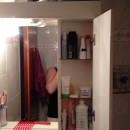I grew in the face of adversity Past Review
By A student (PSYCHOLOGY., Brandeis University) - abroad from 07/22/2013 to 12/13/2013 with
IFSA: Buenos Aires - Argentine Universities Program
I became much more independent and self-reliable. I know that I will be able to pull through for myself, and that I will alway be there for myself. I am much more autonomous and emotionally independent, as I only had myself to cry to for 5 months (family and friends were very supportive, but they couldn't be there with me). I am much more confident in taking on burdens and heavier loads. I am really tough now. I don't let little things get to me.
Review Photos



Personal Information
| How much international exposure did you have prior to this program? | 1 month - 6 months |
Review Your Program
|
* Overall educational experience
Academic rigor, intensity, resources, etc. |
the classes were not as easy as i had anticipated; I still had a fair amount of work to do. However, they were not nearly as challenging as classes at my home institution. the classes in the Human Rights-Social (Derechos Humanos sociales) concentration were terrible. In one of the classes of the concentration, we had a different professor every 2 weeks, making the class very inconsistent. There was a tremendous amount of reading. After each student received a 10/10 on the midterm, I realized that the grading scale was incredibly lenient, and whatever work I had previously put into the class was in vain, as I would receive a high grade regardless of my efforts. For the final exam, which was open note/text, I walked in without having reviewed any of my limited notes from the classes and without having read any of the assigned readings. I received a 9/10 with a note that applauded my knowledge and interpretation of the topic. For the other class in the concentration, we interned for 8 hours a week. This was part of a 3 credit class. If this had been the whole class, it would have seemed just. However, we still had a 2 hour seminar each week about the research we would have to do for the internship, incorporating other classes that we were currently taking. The research paper had to be 12 pages. That made for a 10+ hour course that was worth 3 credits. (10 hours in the class/internship, in addition to the research that it required beyond the classroom). The course was very down-played during orientation and was not described to be nearly as demanding as it was. I also felt like the hardest-working person in the office of my internship. |
|
* Host Country Program Administration
On-site administration of your program |
Some people were useful. Overall, the staff were terrible. Many were rude and unaccommodating. The advising was HORRIFIC! It was really so useless that I felt like I had been thrown into a city and completely new school system with no direction. |
|
* Housing:
How satisfied were you with your living arrangements? |
My house was significantly inferior to those of other students on the program. Mold covered the ceiling in the bathroom that I shared with my host mother. My room was about half the size of my Brandeis dorm room. My bed was two pieces of foam on a wooden plank, held up my 4 inch cinderblocks. The "desk" was about 18 inches wide, and only 13 inches deep, so I couldn't even fit a computer or piece of paper on it. (if a piece of paper is 11 inches long, there is no room to angle it on the desk) Furthermore, because I had no room in the bathroom for anything besides basic shower necessities and a toothbrush, I had to keep other cosmetics on the desk. There was also nowhere to store my suitcase in the house, so it took up the already limited space in my room. I had a small closet, and two tiny drawers. There was more storage space in the room, but she kept her linens and miscellaneous things in there. There were two sources of light: one fixture that hung low from the ceiling, on which I hit my head too frequently, and a small lamp that emitted scarce light and did not even stretch to the desk when I did try to study there. The window was small and located all the way at the top of the room, so there was practically no ventilation. This was a problem every night when she smoked and the air would get trapped in my room, as there was no way to get out. It was also a problem when spring and summer came (varying from 75-95 degrees Fahrenheit), and she did not want to spend money using the air conditioner in her house. She did lend me a fan, but it just blew around hot air. Other students on the program who were in wealthy neighborhoods had much better experiences. My house was not only physically hard to exist in, my host mother also made it more difficult by making it clear that I was NOT welcomed. She made me feel like I shouldn't be seen or heard, and that we only ate dinner together out of obligation. I believe that she was hosting a student for financial benefits, rather than giving a student an invaluable experience. She did not work for the 5 months that I was there. |
| * Food: |
My host mother consistently underfed me. Steamed vegetables and a small salad consisting of arugula and tomatoes is less than a meal. Occasionally I would get pasta. Even more occasionally I would get fish. There were a few nights when I had to go out to eat after "dinner," as I was too hungry to sleep. I lost 15 lbs in my 5 months there. |
|
* Social & Cultural Integration:
How integrated did you feel with the local culture? |
I selected this program because I wanted to become a part of the culture and country. The program did not help the students to meet locals or other students on the program. This made it extremely difficult to make friends abroad. The locals were not interested in befriending Americans. The Argentinean boys/men made it very clear that they were only interested in the American girls for one reason, while the Argentinean girls thought themselves too good to be friends with American girls. The Argentinean boys and girls were more perceptive to the American boys than to the American girls. Argentines are just nice enough to be acquaintances, but do not genuinely want to make friends. |
|
* Health Care:
How well were health issues addressed during the program? |
When we went to the program director's house in Uruguay for Thanksgiving, I lay down in an ant-hill and got about 20 bits on my shoulder. Within 20 minutes, I broke out in hives. The program director sent me to the hospital right away, where I was injected with something (I didn't even ask because I was freaking out that my entire body was covered in hives). (i'm guessing it was epinephrine or some kind of anti-histamine). The doctor was efficient and the program handled the situation quite well. |
| * Safety: |
While I felt safe within my own house, I lost that sense of security as soon as I stepped outside of the house. I almost never felt safe in the city. I had my guard up at all times. My iphone was stolen after only 2 weeks after I arrived. I also did not appreciate the excessive cat-calls and stare downs. Many times the calls crossed the line of just hollering and were sexual harassment. As a 20 year-old woman in a foreign country, I felt threatened. It was impractical to try to go everywhere with a companion, as I had to independently conduct my own life. |
| If you could do it all over again would you choose the same program? |
No
|
Finances
|
* Money: How easily were you able to live on a student's budget?
(1 = not very easy/$200+ on food & personal expenses/week, 2.5 = $100/week, 5 = very easily/minimal cost) |
The illegal exchange rate of ARP to USD is approximately 9 pesos to $1 USD. My living conditions in my homestay were so poor (being unwelcome and not having a place to do work in the house) that I usually went to cafes to do work. I would have to order something. This cost money. Because of the daily avoidances of going "home" and the meals that I would have to find in between classes (because of my schedule I would be out the whole day and would not have time to go home and make myself lunch), I ended spending about 8-10 USD a day. Then, there was transportation. While it is VERY cheap, it adds up. Some weeks I would spend $10 on just subways and buses. Then, there is the cost of socializing. Because I didn't feel safe while I was there, I barely drank. I would have on average 1 drink when going out with friends. On weekends, I'd spend about $40 meals, the few drinks, and cover charges for bars and clubs. It all adds up VERY quickly. |
| Not including program expenses, about how much money did you spend on food and other expenses each week? | $50-$70USD per week |
| Do you have any general money-saving tips for future study abroad participants? | plan your schedule in such a way that you can eat/cook lunch at home. |
Language
| * Did your program have a foreign language component? | Yes |
|
How much did the program encourage you to use the language?
0 = No encouragement, 5 = frequent encouragement to use the language |
|
| How would you rate your language skills at the beginning of the program? | Intermediate |
| How would you rate your language skills at the end of the program? | Fluent |
| What was the highest level language course you had completed prior to departure? | The fourth level of college spanish (HISP 104) |
| How many hours per day did you use the language? | 10+ |
| Do you have any tips/advice on the best ways to practice the language for future study abroad participants? | I met with my teacher for my castellano class for an extra hour and a half every week just to practice and learn more. She helped me SOOO much! If you play a sport (this was not to my advantage because I don't), join a team so that you can become friends with locals and practice your language skills. |
Other Program Information
|
* Where did you live?
Select all that apply |
|
|
* Who did you live with?
Select all that apply |
|
|
* Who did you take classes with?
Select all that apply |
|
| About how many local friends did you make that you will likely keep in touch with? | 0 |
A Look Back
| * What did you like most about the program? |
|
| * What could be improved? |
|
| * What do you know now that you wish you knew before going on this program? | Argentina is NOT "European" as they claim. It was a very developed country that fell far from grace and is now very third-world in many ways. Its government still falls into many patterns from its past dictatorship. It's not democracy as we, americans, know it. The people of Buenos Aires (porteños) are NOT warm, welcoming people. The food in Argentina is lackluster. The wine is great, though. Argentina is NOT Latin America. They make it a point to distinguish themselves from the rest of Latin America because they believe they are closer to Europe. This is a fantasy of theirs, not a reality. I think I wish I would have known about the safety there. I felt very uncomfortable and threatened. Maybe this was exacerbated because I did not have a true support system there. my biggest tip for future students is to change living situations if they're not satisfied. Don't try to stick it out when it's just not right. I was too determined to make it work and to have a be a wonderful experience, like I had heard first-handedly that homestays are. Not everything in your life will be a good experience. Don't become complacent with the bad. Complacency is dangerous, and once you realize you're complacent, you're far into a ditch that you dug and you grow to resent the situation, as it is often not always worth it to fight. Nip it in the bud and make it good. |








